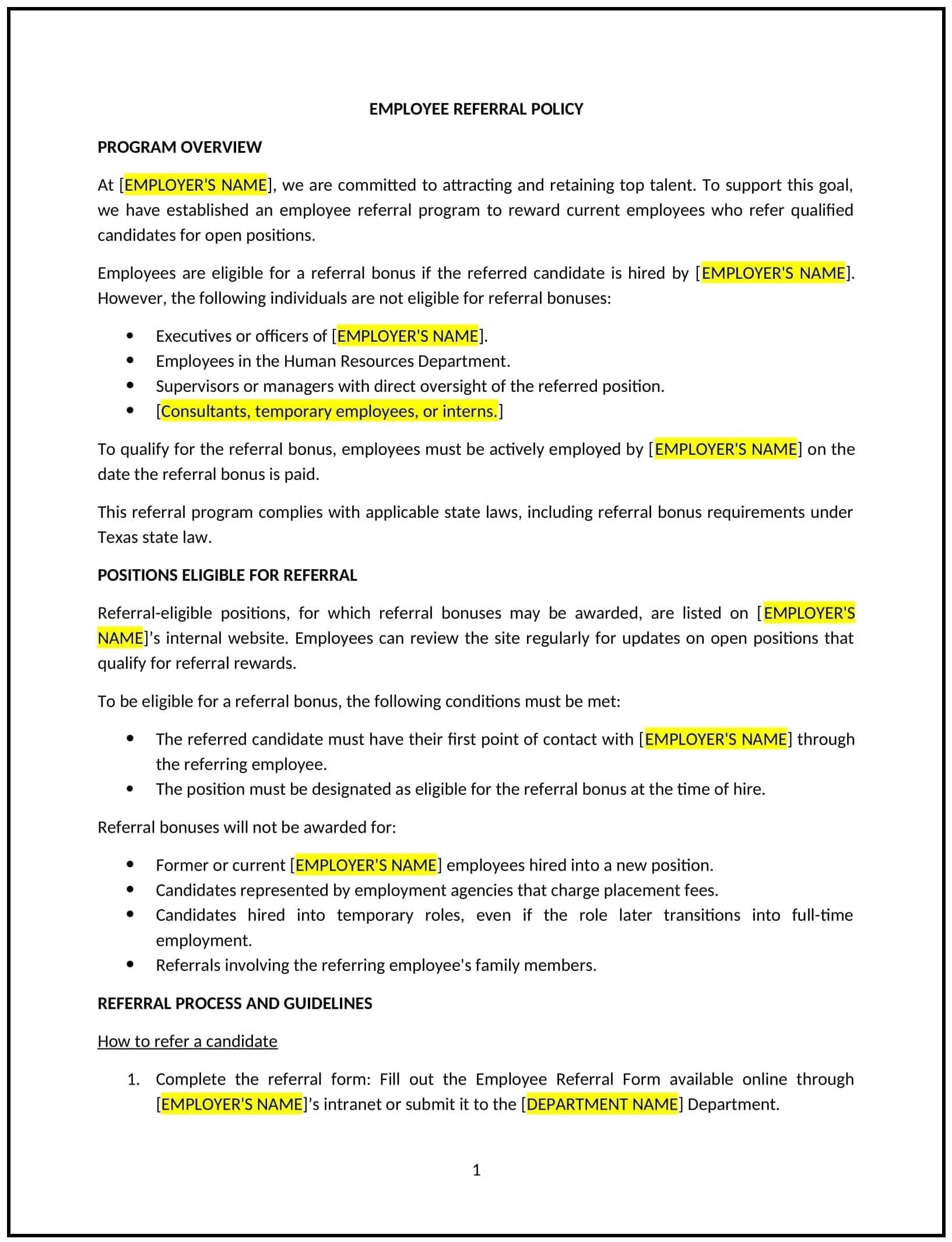Got contracts to review? While you're here for policies, let Cobrief make contract review effortless—start your free review now.

Customize this template for free
Employee referral policy (Texas)
This employee referral policy is designed to help Texas businesses establish clear guidelines for encouraging and managing employee referrals. Whether businesses are seeking to attract top talent, reduce recruitment costs, or tap into employees' networks for quality candidates, this template provides a structured approach to creating an effective referral program.
By adopting this policy, businesses can enhance their recruitment efforts, reward employees for their contributions, and ensure fairness and transparency in the hiring process.
How to use this employee referral policy (Texas)
- Define eligibility: Specify which employees are eligible to participate in the referral program, including whether referrals can come from full-time, part-time, or temporary employees, and whether there are any restrictions on referring family members or close associates.
- Outline the referral process: Clearly describe the steps for making a referral, including how employees should submit candidates (e.g., via email, an online portal), the information they need to provide, and any required forms or documentation.
- Set referral reward structure: Specify the rewards or incentives employees will receive for successful referrals, whether in the form of bonuses, gift cards, additional paid time off, or other incentives, and outline when rewards will be given (e.g., after the new hire completes a probationary period).
- Address candidate eligibility: Define the criteria for what makes a referral eligible for the program, such as meeting job qualifications, completing an application, and passing necessary background checks or interviews.
- Establish transparency and fairness: Ensure that the referral process is fair, non-discriminatory, and transparent, and outline how referrals will be evaluated in relation to other applicants.
Benefits of using this employee referral policy (Texas)
This policy offers several benefits for Texas businesses:
- Reduces recruitment costs: Employee referrals are often more cost-effective than traditional recruitment methods, reducing the need for external recruiters or expensive job advertisements.
- Attracts quality candidates: Employees are likely to refer candidates who fit the company culture and have the necessary skills, leading to better-quality hires.
- Improves employee engagement: A well-structured referral program shows that the company values employees' input in the hiring process, which can boost morale and engagement.
- Accelerates the hiring process: Referral candidates are often pre-vetted by employees, speeding up the recruitment process and reducing time-to-hire.
- Strengthens company culture: Referring friends or acquaintances can lead to hires who are a good cultural fit, enhancing team dynamics and improving retention.
Tips for using this employee referral policy (Texas)
- Communicate the policy clearly: Ensure all employees are aware of the employee referral program, including eligibility criteria, the referral process, and the incentives offered for successful referrals.
- Promote the program: Regularly remind employees about the referral program through company newsletters, team meetings, or internal communications, and encourage them to take part in the process.
- Set clear timelines: Define the timelines for submitting referrals and the process for evaluating them to ensure that candidates are considered in a timely manner.
- Track and report on referrals: Keep a record of all employee referrals and the outcome of each, tracking which employees make successful referrals and rewarding them according to the policy.
- Review and update regularly: Regularly review the policy and the referral program's success to ensure that it is meeting the company’s recruitment needs and providing adequate rewards for employees.